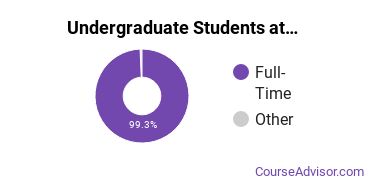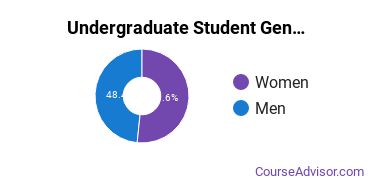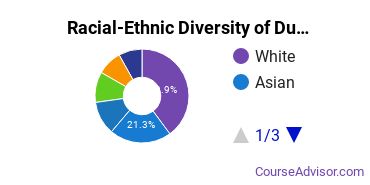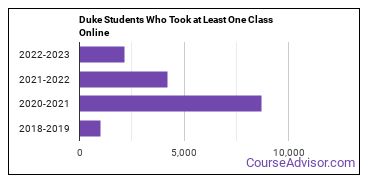Duke University Overview
Duke University is a private not-for-profit institution situated in Durham, North Carolina. The location of the school is great for students who enjoy the amenities of city life.
What Is Duke University Known For?
- Students who want to work more closely with their professors have an easier time at Duke since the student to facuty ratio is 6 to 1.
- Students at Duke have an easier time paying back their loans. The school's student loan default rate is only 0%, compared to the national rate of 10.1%.
- The highest award offered at Duke is the doctor's degree.
- In <nil>, 91% of the faculty were full-time.
- After graduation, Duke bachelor's degree recipients go on to jobs where they make $97,418 a year. That's about 139% more than their peers at other schools.
- It takes the average Duke student 4.1 years to graduate. This is pretty good when compared to the national rate of 4.4 years.
Featured schools near , edit
Where Is Duke University?

Contact details for Duke are given below.
| Contact Details | |
|---|---|
| Address: | 103 Allen Bldg, Durham, NC 27708 |
| Phone: | 919-684-8111 |
| Website: | www.duke.edu |
How Do I Get Into Duke?
You can apply to Duke online at: admissions.duke.edu/application/instructions
Admission Requirements for Duke
| Submission | Required? |
|---|---|
| High School GPA | Recommended |
| High School Rank | Recommended |
| High School Transcript | Required |
| College Prep Program | Required |
| Recommendations | Required |
| SAT or ACT Scores | Required |
| TOEFL | Recommended |
How Hard Is It To Get Into Duke?
Approximately 45% of accepted students are men and 55% are women. The acceptance rate for men is 6%, and the acceptance rate for women is 6%.
Average Test Scores
About 47% of students accepted to Duke submitted their SAT scores. When looking at the 25th through the 75th percentile, SAT Evidence-Based Reading and Writing scores ranged between 725 and 765. Math scores were between 743 and 793.
Can I Afford Duke University?
The net price is calculated by adding tuition, room, board and other costs and subtracting financial aid.
Student Loan Debt
It's not uncommon for college students to take out loans to pay for school. In fact, almost 66% of students nationwide depend at least partially on loans. At Duke, approximately 20% of students took out student loans averaging $7,590 a year. That adds up to $30,360 over four years for those students.
The student loan default rate at Duke is 0.1%. This is significantly lower than the national default rate of 10.1%, which is a good sign that you'll be able to pay back your student loans.
Duke University Undergraduate Student Diversity

There are also 10,737 graduate students at the school.
Gender Diversity
Of the 6,838 full-time undergraduates at Duke, 48% are male and 52% are female.

Racial-Ethnic Diversity
The racial-ethnic breakdown of Duke University students is as follows.

| Race/Ethnicity | Number of Grads |
|---|---|
| Asian | 1,459 |
| Black or African American | 552 |
| Hispanic or Latino | 719 |
| White | 2,729 |
| International Students | 589 |
| Other Races/Ethnicities | 790 |
Geographic Diversity
North Carolina students aren't the only ones who study at Duke University. At this time, 49 states are represented by the student population at the school.
Over 126 countries are represented at Duke. The most popular countries sending students to the school are China, India, and South Korea.
Online Learning at Duke University
The following chart shows how the online learning population at Duke has changed over the last few years.

Online Growth Rankings of Duke
The average growth rate over the last four years of online students at Duke University was 71.4%. This is the #523 largest growth rate of all schools that are only partially online. This refers to all students at Duke regardless of major.
When we speak of partially online, we are referring to schools whose online population is less than 50% of its total student body. Mostly online refers to those with online populations greater than or equal to 50%.
References
*The racial-ethnic minorities count is calculated by taking the total number of students and subtracting white students, international students, and students whose race/ethnicity was unknown. This number is then divided by the total number of students at the school to obtain the racial-ethnic minorities percentage.
- College Factual
- National Center for Education Statistics
- Image Credit: By Bjoertvedt under License
More about our data sources and methodologies.
Featured Schools
 Request Info
Request Info
|
Southern New Hampshire University You have goals. Southern New Hampshire University can help you get there. Whether you need a bachelor's degree to get into a career or want a master's degree to move up in your current career, SNHU has an online program for you. Find your degree from over 200 online programs. Learn More > |
